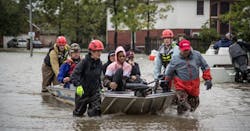Much of the southern United States faces months—if not years—of cleanup and reconstruction following Hurricanes Harvey and Irma. As transportation providers begin to recover from the immediate disruption and delays caused by the hurricanes, the greater domino effect of the hurricanes on supply chains will begin to appear.
Early data shows that most supply managers believe that Hurricane Harvey, which caused widespread destruction in south Texas and the closure of the Port of Houston, will impact supply chains in coming months. The Institute for Supply Management (ISM) recently released the results of a special survey to assess how Hurricane Harvey impacted six key metrics. ISM’s survey found that the majority of responding supply managers believe input materials pricing will be somewhat negatively impacted and the majority of respondents believe supplier deliveries will be at least somewhat negatively impacted over the next three months.
Often, supply chain and procurement executives and managers will be able to work collaboratively with other supply chain partners that have been similarly impacted by the storms to reach amicable resolution of delays and disruptions that follow a hurricane. For example, as a matter of good business and goodwill, a supply chain partner may be willing to overlook delays or adjust the cost of materials to offset the impact of the supply chain disruption. Still, it is imperative to give early and critical thought to the potential lasting effects of a hurricane on an organization’s supply chain so that the organization can effectively communicate with its supply chain partners, utilize insurance coverage and address potential contract concerns.
First, as most supply chain and procurement executives and managers have already experienced, communicating early and often to supply chain partners can help alleviate the impact of storms on the supply chain. Such communications foster transparency and can help businesses on the providing and receiving sides to better prioritize tasks that must be completed (such as the shipment of particular goods) in the wake of such extensive supply chain disruption. Effective communication should help enable effective collaboration.
Next, it is important that an organization consider the potential reach of the consequences of a hurricane so that the organization can review all of its available insurance coverage to determine whether any coverage may be available. For example, if an organization experiences long and costly supply chain delays, such as shortages of raw materials, that ultimately impact its ability to adequately and timely manufacture goods, the organization will want to consider the availability of insurance coverage. Then, the insured will need to carefully review its policy to understand what is covered and what is not.
Continue reading at Material Handling & Logistics.











